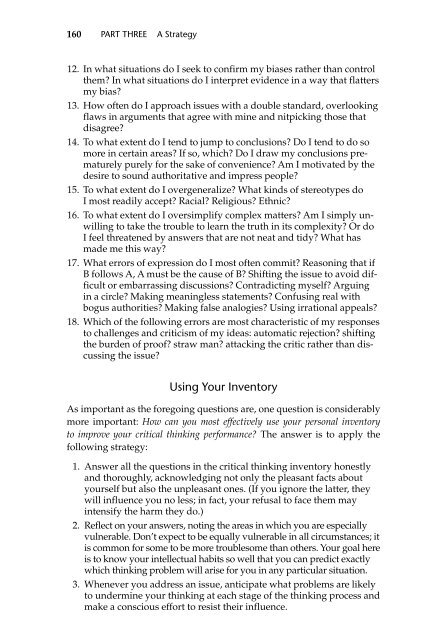Beyond Feelings
Beyond Feelings
Beyond Feelings
Create successful ePaper yourself
Turn your PDF publications into a flip-book with our unique Google optimized e-Paper software.
160 PART THREE A Strategy<br />
12. In what situations do I seek to confirm my biases rather than control<br />
them? In what situations do I interpret evidence in a way that flatters<br />
my bias?<br />
13. How often do I approach issues with a double standard, overlooking<br />
flaws in arguments that agree with mine and nitpicking those that<br />
disagree?<br />
14. To what extent do I tend to jump to conclusions? Do I tend to do so<br />
more in certain areas? If so, which? Do I draw my conclusions prematurely<br />
purely for the sake of convenience? Am I motivated by the<br />
desire to sound authoritative and impress people?<br />
15. To what extent do I overgeneralize? What kinds of stereotypes do<br />
I most readily accept? Racial? Religious? Ethnic?<br />
16. To what extent do I oversimplify complex matters? Am I simply unwilling<br />
to take the trouble to learn the truth in its complexity? Or do<br />
I feel threatened by answers that are not neat and tidy? What has<br />
made me this way?<br />
17. What errors of expression do I most often commit? Reasoning that if<br />
B follows A, A must be the cause of B? Shifting the issue to avoid difficult<br />
or embarrassing discussions? Contradicting myself? Arguing<br />
in a circle? Making meaningless statements? Confusing real with<br />
bogus authorities? Making false analogies? Using irrational appeals?<br />
18. Which of the following errors are most characteristic of my responses<br />
to challenges and criticism of my ideas: automatic rejection? shifting<br />
the burden of proof? straw man? attacking the critic rather than discussing<br />
the issue?<br />
Using Your Inventory<br />
As important as the foregoing questions are, one question is considerably<br />
more important: How can you most effectively use your personal inventory<br />
to improve your critical thinking performance? The answer is to apply the<br />
following strategy:<br />
1. Answer all the questions in the critical thinking inventory honestly<br />
and thoroughly, acknowledging not only the pleasant facts about<br />
yourself but also the unpleasant ones. (If you ignore the latter, they<br />
will influence you no less; in fact, your refusal to face them may<br />
intensify the harm they do.)<br />
2. Reflect on your answers, noting the areas in which you are especially<br />
vulnerable. Don’t expect to be equally vulnerable in all circumstances; it<br />
is common for some to be more troublesome than others. Your goal here<br />
is to know your intellectual habits so well that you can predict exactly<br />
which thinking problem will arise for you in any particular situation.<br />
3. Whenever you address an issue, anticipate what problems are likely<br />
to undermine your thinking at each stage of the thinking process and<br />
make a conscious effort to resist their influence.


